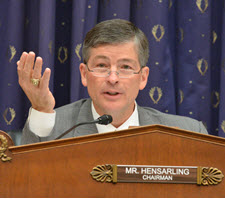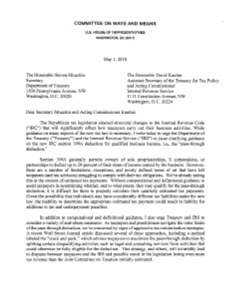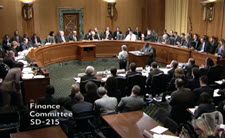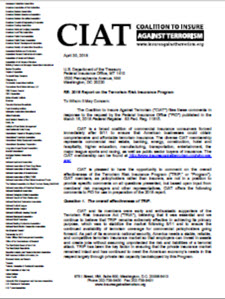House GOP leaders have recently signaled a deal could be reached this month between the House and Senate to pass the first rewrite of the 2010 Dodd-Frank Act (DFA). A Senate DFA financial reform bill passed in March includes a measure to reform the Basel III High Volatility Commercial Real Estate (HVCRE) Rule – a top Roundtable priority.
 |
House Financial Services Committee Chairman Jeb Hensarling, (R-TX) said he is open to moving the Senate-passed Dodd-Frank reform bill without changes if there are "other pathways" to advance House financial reform bills not included in the Senate plan. ( Wall Street Journal , April 26) |
The bipartisan HVCRE measure originated in the House of Representatives as the Clarifying Commercial Real Estate Loans bill (H.R. 2148), which was introduced by House Financial Services Committee members Representatives Robert Pittenger (R-NC) and David Scott (D-GA). After being voted out of the committee by a near unanimous vote (59-1), it passed the House by voice vote in November of last year (Roundtable Weekly, Nov. 10). The Senate Banking Committee took up an identical bill in February (S. 2405), which was co-sponsored by Senators Tom Cotton (R-AR) and Doug Jones (D-AL).
With the HVCRE measure included in the Senate-passed DFA financial reform bill, the legislation has lingered in the House amid requests from conservatives, led by House Financial Services Committee Chairman Jeb Hensarling, (R-TX), for more extensive changes. (Roundtable Weekly, March 16 and March 23)
Substantive changes by the House would likely send an amended bill back to the Senate, which could threaten support by Senate moderates and sink the prospects for passing the legislation. Hensarling told reporters last week, "I'm not naïve. Ultimately the fate of these House bills rests in approximately eight self-styled moderate Senate Democrats." (Reuters, April 26)
Hensarling added that he is open to moving the Senate bill without changes if there are "other pathways" to advance House financial reform bills not included in the Senate plan. (Wall Street Journal, April 26)
Speaker of the House Paul Ryan (R-WI) on Monday said, "… the capstone of our regulatory reform agenda is our replacement of Dodd Frank. We already have a bill out of the House. We have a bill out of the Senate, which is pretty amazing. So, we're gonna get that done." He added, "We're a few weeks away from getting our bill into law that rewrites the Dodd Frank law." (The Weekly Standard, April 30)
House Majority Leader Kevin McCarthy (R-CA) this week reiterated that the effort to pass modest DFA reforms, versus repeal, will come soon. "I think you are within a month of getting it ... done," McCarthy said Monday during the Milken economic conference. He pledged that the legislation will be delivered to President Trump before November's midterm elections, saying, "At the end of the day there will be a bill at the President's desk." (Reuters, April 30)
Changes to HVCRE Rule
If the Senate bill moves forward in the House, its Roundtable-supported HVCRE language would clarify and reform the Basel III High Volatility Commercial Real Estate (HVCRE) Rule that has created needless confusion and increased borrowing costs.
 |
The Roundtable and twelve other real estate organizations on March 2, 2018 sent a comment letter urging all members of the Senate Banking Committee to take the necessary steps to enact S. 2405 by including the measure in the broader Dodd-Frank reform package (S. 2155). |
The current HVCRE Rule is overly broad and includes many stabilized loans without construction risk in this HVCRE category, unduly burdening those loans with capital charges meant to protect banks from heightened construction risks. As a result, banks, including small community financial institutions, have been deterred from making this type of loan, which can represent up to 50 percent of a small bank loan portfolio.
The Senate's HVCRE measure would clarify which types of loans should be classified as HVCRE loans to ensure they do not impede credit capacity or economic activity, while still promoting economically responsible commercial real estate lending. ( Roundtable Weekly, Jan. 12).
Importantly for borrowers, the 15% equity requirement would be revised to expressly include contributed land/property at the appreciated land value as determined by a FIRREA appraisal and bank review (versus the cost basis under the current rule). The measure would also clarify that loans made to acquire existing property with rental income and/or do cosmetic upgrades and other improvements don't trigger the capital penalty.
HVCRE reform has been a top policy priority of The Real Estate Roundtable and its industry coalition partners, who have submitted numerous policy comment letters to policymakers since 2015. The Roundtable's HVCRE Working Group has also played a key role in advancing these specific reforms. (Roundtable letter, March 2)
Clarifying guidance on the new pass-through deduction enacted in last year's tax overhaul bill is needed "as soon as possible," according to a letter sent this week by House Ways and Means Committee Ranking Member Richard Neal (D-MA) to Treasury Secretary Steven Mnuchin and Acting Internal Revenue Service Commissioner David Kautter. (Neal Letter, May 1)
 |
Clarifying guidance on the new pass-through deduction enacted in last year's tax overhaul bill is needed "as soon as possible," according to a letter sent this week by House Ways and Means Committee Ranking Member Richard Neal (D-MA) to Treasury Secretary Steven Mnuchin and Acting Internal Revenue Service Commissioner David Kautter. (Neal Letter, May 1) |
The new tax relief for pass-through businesses is a core element of the Tax Cuts and Jobs Act signed by President Trump in December – and is vital to ensure that the legislation treats all types of businesses, including real estate, fairly and equitably. (Roundtable Weekly, Dec. 22, 2017)
The Tax Cuts and Jobs Act reduced the top tax rate on corporations by 40 percent. The new 20 percent pass-through deduction (section 199A) can lower the top tax rate on qualifying pass-through business income to 29.6 percent. Such income was previously taxed at a top rate of 39.6 percent.
In January, The Roundtable wrote to Treasury Secretary Mnuchin offering several suggestions designed to maximize the economic impact of the pass-through deduction and avoid unnecessary disruptions to business activity. [Roundtable Letter, Jan. 18].
Specifically, the letter urged Treasury to issue guidance:
 |
The new tax law, enacted last December, was the subject of a Senate Finance Committee hearing last week, where Senate Democrats focused on the pass-through deduction. ( SFC hearing , Early Impressions of the New Tax Law – April 24) |
In Neal's letter sent this week, the top democrat on the tax-writing House Ways and Means Committee cites taxpayer (and tax advisors) confusion over the deduction, stating, "Without computational and definitional guidance to assist taxpayers in determining whether, and to what extent, they may quality for the pass-through deduction, it is difficult for them to properly calculate their quarterly estimated tax payments." (Neal Letter, May 1)
Neal adds, "As a result, taxpayers are left struggling to understand its implications, and opportunities to exploit its ambiguities abound. I urge Treasury and IRS to issue guidance as soon as possible to address these concerns."
He also urges the Trump Administration to issue guidance to prevent abuses of the pass-through deduction. "As taxpayers and practitioners navigate the outer limits of the pass-through deduction, we're concerned about signs of aggressive tax-minimization strategies," Neal states in the letter.
The new tax law, enacted last December, was the subject of a Senate Finance Committee hearing last week, where Senate Democrats focused on the pass-through deduction. ( SFC hearing , Early Impressions of the New Tax Law– April 24)
The Roundtable and its partners in the Coalition to Insure Against Terrorism (CIAT), submitted detailed comments Monday on the overall effectiveness of the Terrorism Risk Insurance Program (TRIP) to the U.S. Department of Treasury's Federal Insurance Office (FIO).
 |
This week's comments support TRIP as a "tremendous success" yet provide recommendations on three primary aspects of the program: Standalone terrorism insurance; Nuclear, Biological, Chemical or Radiological (NBCR) availability; and Cyber terrorism. |
The Terrorism Risk Insurance Program Reauthorization Act of 2015 (TRIPRA) requires Treasury to issue proposed rules to implement changes to TRIP, which is set to expire on Dec. 31, 2020 (Roundtable Weekly - Jan. 16, 2015)
As FIO works on preparing its 2018 report on TRIP's effectiveness, the coalition's comment letter presents views from policyholders and risk managers – and supplement earlier remarks submitted by CIAT in 2016 (Roundtable Weekly, June 3, 2016).
This week's comments support TRIP as a "tremendous success" yet provide recommendations on three primary aspects of the program: Standalone terrorism insurance; Nuclear, Biological, Chemical or Radiological (NBCR) availability; and Cyber terrorism.
The CIAT comments note there has been no evidence that private markets can develop adequate terrorism risk capacity without some type of federal participation. The letter also notes that "in the wake of a major terrorist attack, (the program) ensures that a significant portion of the costs of recovery would be borne by the private sector."
The comments also include a suggestion that FIO should consider making the program permanent, stating that most other countries insurance programs are "of continuous duration, and it would benefit market stability to make TRIP permanent as well."
How other nation's implement terrorism risk insurance programs was the focus of a discussion with Julian Enoizi, chief executive of Pool-Re during last week's Spring Roundtable Meeting in Washington, DC.
Additionally, Marsh recently released its 2018 Terrorism Risk Insurance Report, which presents data on purchasing and pricing trends in the terrorism insurance marketplace. The report finds that the highest terrorism insurance take-up rates by industry in 2017 were real estate companies, education entities, health care organizations and financial institutions. It also explores how the terrorism insurance market continues to innovate and respond to the needs of global organizations in light of an evolving risk landscape. (BusinessInsurance, April 20, 2018)
With TRIP set to sunset at the end of 2020, The Roundtable has formed a Terrorism Risk Insurance Working Group to explore potential options in advance of the reauthorization debate that is expected to begin in earnest next year. The Working Group's goal is to develop a strategy for a permanent, or long-term, national terrorism insurance program that would enable policyholders to secure the terrorism risk coverage they need without facing periodic renewals by the government.